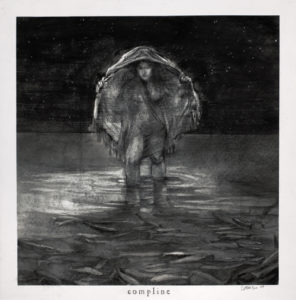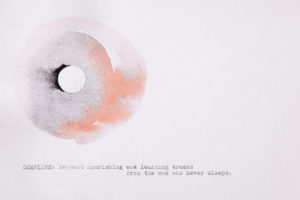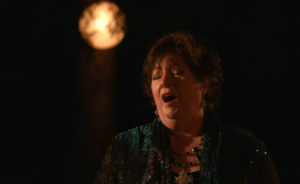The Hour of Compline: The moon has risen. We enter the night rest.
September 14, 2021
This is the last in a series of eight reflections on the Hours of prayer, focusing on Compline—the end of the day when we are ready for bed. This series celebrates the release of the Praying the Hours soundtrack by Lolo Meares. An excerpt from the soundtrack starts the post so that you can have her sonic imagination of the gratitude and love that characterize this Hour in your mind as you read. (This link to the album can also be found at the bottom of this essay, along with a link to the book Praying the Hours in Ordinary Life from which the essay comes.)
Time to sleep.
Each night, when the moon has conquered the horizon of day and the sky has dimmed, we anticipate the release into sleep. With or against our wills, sleep will overtake us, even if we fight with all our strength, as most children do. Enforced sleeplessness is, in fact, a form of torture, for we are designed to cycle between wakefulness and dreams, much as the earth keeps its similar and accommodating rhythms. It is an inviolable cycle of nature.
Like so many wonders of our lives, sleep is made common by its familiarity. But think of it—we rehearse this little death with hardly a thought of the bizarre and unknown world we enter. We are lulled there by our own weariness, by some internal knowledge, and yet what state could be more strange, more intimidating? In the night, when “like a roaring lion your adversary the devil prowls around, looking for someone to devour,” we are dragged through the portal of sleep into dreams, into a world hidden from consciousness. Vulnerable, without the awareness allowed even to Alice, we spend nearly half our lives in a wonderland of absurdity. Into that dark we go alone, as if in a fairy tale or horror film, only to emerge with little memory of where we have been or for how long.
God has shaped us so that we are forced to keep this Sabbath of the body, and yet God has left keeping the Sabbath of the soul to our inadequate discretion. Why so insistent and inscrutable a strategy? The Psalmist urges for a balance not often considered: “It is vain for you to rise up early, To retire late, To eat the bread of painful labors; For He gives to His beloved even in his sleep” (Psalm 127:2 NAS).
What happens to our spirits as we sleep? The author of the hymn best known for its last verse, the “doxology,” Thomas Ken wrote in another verse, “when in the night I sleepless be, my soul with heavenly thoughts supply.” Ken implies that dreams might be vessels for a form of God’s wisdom that is above or beyond conscious thought. The suffering servant Job agrees, “In a dream, for instance,” he recounts, “a vision at night, when men and women are deep in sleep, fast asleep in their beds—God opens their ears and impresses them with warnings to turn them back from something bad they’re planning, from some reckless choice, and keep them from an early grave, from the river of no return” (33:15–18, The Message).
Here is a mystery then: why not enter sleep as though embarking on a great journey into the unknown—a journey for which we might actually prepare? Why not go into sleep with intention and prayers for guidance? In this Hour of Compline, we are urged by the ancients to request nourishing and learning dreams from the One who never sleeps, who never slumbers. So perhaps we may request the presence of God not just “my soul to keep” but to accompany us, like Virgil with Dante, into the hells and heavens played out in our sleeping hours, and to teach us these life-preserving things that would remain otherwise hidden.
“A peaceful night and a perfect end give us,” the monks pray in this hour. The Compline hymn requests defense through the night against danger and terror, protection against evil. Yet Compline is a contemplative office characterized by spiritual peace. In many monasteries it is the custom to begin the “Great Silence” after Compline, during which the whole community, including guests, observe silence throughout the night until the morning service the next day. “Be vigilant!” those entering this great silence are warned, “you are entering the night rest.” Yes, be vigilant and keep silence, but do so in order to listen. Learn from the Hour of Compline not to fear death but to anticipate its wonder, for to succumb at the end of each of each day is the same as with the sum of them—to journey toward morning.
Ich lebe mein Leben in wachsenden Ringen
I live my life in ever-increasing circles
that stretch across all things.
I may not manage to complete the final circle
still I must attempt it.
I revolve around God, the tower of old,
and I spin amidst thousands of years.
Yet I remain unclear of my role—
am I a falcon,
a storm,
or a beautiful song?
—Rainer Maria Rilke, The Book of Hours, I, 2
translated by Martina Nagel

Denise Louise Klitsie’s reflection on the Hour of Compline as we prepare for sleep. (illustration from the book Praying the Hours in Ordinary Life)
Excerpt on Compline from Praying the Hours in Ordinary Life by Lauralee Farrer and Clayton J. Schmit, Wipf and Stock, 2010, used with permission and found here. Excerpt from the album on Compline, from the Praying the Hours soundtrack by Lolo Meares—with artwork by Lori Fox—can be freely streamed or purchased here.
*This Just In: Thank you Jonathan and Linda for your generous contributions to the release of this project and ongoing costs of Burning Heart Productions filmmaking. Our friendships, though each from different worlds, go deep and have lifetime warranties. (If readers want to see the film or receive updates, write to info@burningheartproductions.com. To contribute to its release, go here.)



